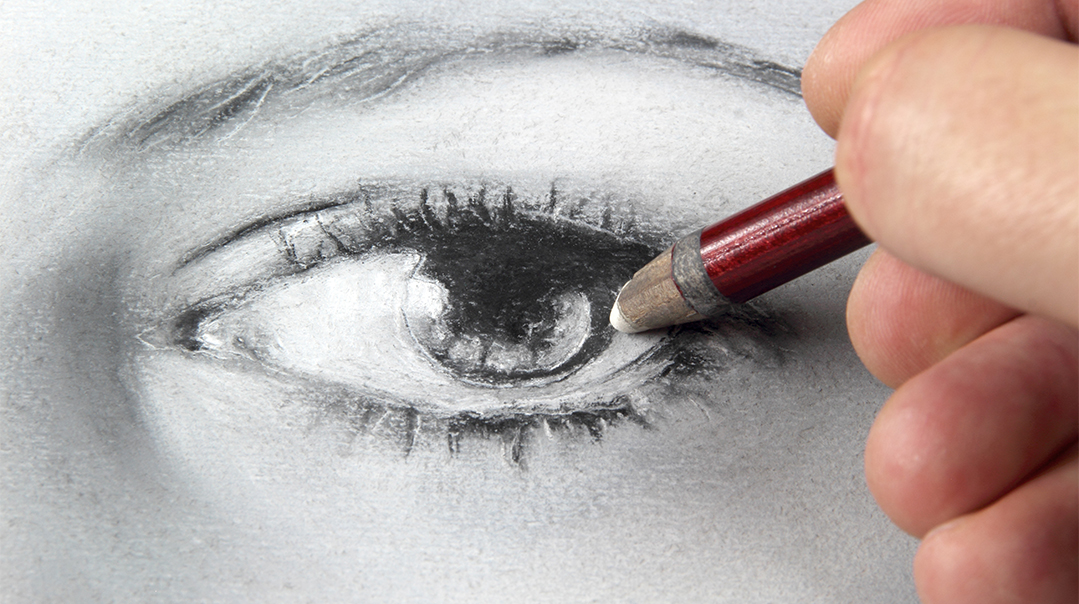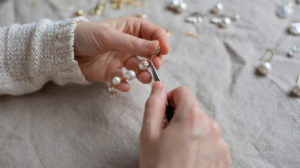Mosaic Eyes

I want to get married. I know I have Down syndrome, but I’m high-functioning. That’s what Mommy tells her friends on the phone.

Henna
I don’t know who thrusts a broom into my hands and orders, “Dance!” The crowd steps back and I’m in the middle of a clapping circle, broom in hand. Clarinets play the first notes of the mezinka tantz. Chumi, a fountain of silk and lace, is my youngest child, after all; she waits for me to sweep my house clear of children.
But even with Chumi married, my home is not empty.
“No.” I shake my head and drop the broom. It clatters on the polished floor. Through the peacock colors rushing around me I find Miriam. I stretch out my hands and grab her, twirling her around until joy beams through her puffy eyes and wide smile. And I dance, hovering on the hairsbreadth line between joy and sorrow, drinking my fill of each.
Then I let go. I step back and leave Miriam alone in the center of the circle, a dumpy woman-child. She sways to the beat, raises her arms above her head. Her hands are like a song, ululating and trilling as they wave to the music. A hundred rays of light hang in the chandeliers above the dance floor. For me, they are eclipsed by Miriam’s face as she dances for her younger sister.
And then we dance, the three of us, Miriam, Chumi, and me. I look into Miriam’s eyes and they are a mosaic. There’s joy, but there’s something else as well — a quivering uncertainty that I wonder if she even knows is present.
Miriam
Sunny smile
Helpful and kind
Good job
This is my list. It’s not so long, but it’s not so short. Chumi and Sari and Penina all made lists of what they want in a chassan. I sat on their beds as they wrote. I listened. Sometimes they wrote things down, like sensitive or outgoing, but not too loud. Sometimes they just laughed. I kept their lists safe for them, and when they got engaged I tried to check off all the things they got right. Sari got two things right, but Chumi and Penina didn’t get anything.
So instead of copying my sisters and not being able to check off anything, I wrote a list of all my good points. Then a boy can look at them and know if I’ll be a good wife for him. He doesn’t even need to check them off.
I want to get married. I know I have Down syndrome, but I’m high-functioning. That’s what Mommy tells her friends on the phone. I’m 28 now. Now that Chumi’s married, I’m the only child at home. It’s time to think about settling down.
I have a good job. I wrote that on my list. I only started three weeks ago. I walk two blocks and cross three streets until I come to Golden Gleam Retirement Home. There, I serve Mrs. Fleischmann chamomile tea, Mrs. Nitzan coffee with full-fat milk and two sugars. (I don’t tell the doctor, because she tells me not to.) I boil the kettle again, and pour Mrs. Kirschner an Earl Grey with a splash of milk. I clean up the counter after, because I don’t think Etty, my supervisor, would like me leaving milk drops on the counter, although Mrs. Kirschner says that Etty shouldn’t begrudge a splash to an old lady.
I have friends, too. After work, I go to the Sunshine Club. It’s called that in the winter, too. This week, my friend Simcha had a cold and she told me a joke. What runs that never walks? Your nose. Funny! I wrote it down to make Mommy laugh, but I forgot to tell her.
Chumi just got married. She’s 24. She was scared something was wrong with her. I said, Chumi, nothing’s wrong with you. Only with them. We shared a room. At night, when she thought I was asleep, she cried. Then, I got out of bed and stroked her hair.
In the morning, she didn’t look at me. Just at the floor. And she said. “You don’t understand. I’m so ... lonely.”
But Chumi was wrong. I also feel lonely.
Yesterday, after work, I found Mrs. Burns’s number in the phonebook. Carrie, my OT, taught me how to use the phone book. First look for the B. That’s easy — right after A. And then there’s the U, and then the R, and the N and S until you have BURNS. But sometimes, Carrie said, there’s a lot of the same name, so you have to look through them all.
So I put my finger on the place — Carrie taught me that, too, otherwise you get all confused — and then I found Burns, David Raizel. Ha-ha. Her name is not David Raizel. It’s just Raizel. But she’s called Raizy. Like I’m called Miriam, but Etty calls me Miri. Or, “Miri honey.” Which I don’t like. Honey is so sweet it burns my throat and makes my tongue push up inside my mouth.
I dial the number carefully.
“Hello?” Mrs. Burns says.
I talk slow and clear. “It’s Miriam Weiner here.”
“Oh, Miriam, how are you? How’s the family? Chumi’s settling down nicely I hear, baruch Hashem, baruch Hashem. Such a simchah, especially when girls get a little older, and a beautiful chasunah. You looked gorgeous — that updo was divine.”
“Thank you.” I did look nice at the chasunah. My hair is blonde, and it’s thin. Near the front, to the right, there’s no hair at all. The hairdresser spent an hour doing my hair. She piled curls on the top. My hair is straight, not curly, but she made curls with a hot thing. It didn’t look thin at all, just pretty.
“Mrs. Burns, I want you to find me a shidduch.”
Mrs. Burns is quiet for a long time. “Miriam, honey ... Uh ... Let me talk to your parents about this. I ... I don’t think I have anyone right now who would be good for you.”
“I can wait. It took you six years to find Chumi’s bashert.”
“Six? I think it was five. Still. Yes, I hear. Miriam, we’ll be in touch, okay?”
She’s about to put down the phone, so I say, “Wait!”
“Yes?”
“I know I’m different,” I say, and then I think about something I read in a card in a shop. “People are like chocolates,” I tell her. I don’t remember the end of the message, so I make it up. “I think I have nuts inside my chocolate. Maybe pecans. But I’m still sweet.”
“Oh, Miriam,” she says. Then she hangs up.
Henna
“Henna?”
“Who is this, please?” I have half an hour to cook dinner. Why did I pick up the phone?
“Henna, it’s Raizy.”
Raizy isn’t much of a schmoozer. I can talk while I put up a soup. “Raizy? How’s it going?”
“Busy, baruch Hashem. How’s the young couple?”
“Good. Settling down. Maybe they’ll even make Shabbos one of these weeks.”
“A lot of work, huh?”
“Good work.” I stand in front of the open fridge, looking in the crisper. Zucchini, carrots, celery ... if I add barley, it’ll be enough for a vegetable soup.
“Henna, Miriam called me.”
“What?”
“Miriam. She’s a doll.”
“How did she know your number?”
“Not such a question. She’s a bright girl. So ... you listening? She asked me to find her a shidduch.”
“She did?” Oh, boy.
“She called this afternoon. She’s a credit to you, Henna. Such middos.”
I dump the vegetables on the counter and lean against the oven. Raizy continues.
“Maybe she’s lonely. Now that Chumi’s married.”
“Maybe. They shared a room.”
“So get her some company. She’ll forget about this idea, don’t worry.”
“Right.”
“Have a good day, Henna.”
“You too.”
I stay by the oven for a few minutes. Then I take a deep breath, hold my head in my hands, and laugh. Miriam is just so ... transparent. Chumi, Sari, Penina ... they were all so complicated about their feelings — even now, Sari is giving me the silent treatment, because — oh, I don’t even remember why. Hormones, probably.
Not one of the kids talked to me straight after coming back from a shidduch. Till one, maybe two in the morning, when they’d tap softly on my bedroom door and ask if I wanted a cup of tea. I’d haul myself out of bed, because when kids want to talk, a mother listens. Halevai they’d tell me straight, like Miriam. I would have gotten a lot more sleep in the last few years.
I abandon the soup to search through my supply of gifts. Embroidered hand towels for vort gifts, tchatckes for the grandkids, a bath set reduced to half-price. There must be something good for Miriam, something to make her feel special. Right at the back, I spy it. A 500-piece puzzle. I must have bought it a while ago and forgotten to give it to her.
I knock on her bedroom door. “Miriam?”
She opens the door and gives me a kiss. “Hi, Mommy! I didn’t hear you come in.”
“How was work?”
“Good. And you?”
“Okay.”
She notices the box in my hand. “Is that for me? A gift? How come?”
“Just because.” I put the puzzle on her desk and she picks it up, staring at the picture on the box — a flock of geese, flying in a perfect V-formation.
“Thanks!” She leans over and strokes my cheek. Her fingers are rough.
“Sure.”
“Will you do it together with me?”
I hesitate. I should sit and do the puzzle with her. And while we press the tiny pieces into each other, I should talk about her phone call with Raizy and listen to her ideas about marriage and whatever else she’s thinking about. But ... supper. And Chumi’s coming at 8. She wants help picking out the photos for their chasunah album. Miriam will enjoy helping. I stand up and brush down my skirt. “Another time. I have to finish supper.”
Miriam’s shoulders droop, and for a second, she lets her blonde hair fall over her face. She lifted a stubby finger and pushes it to the side. “Okay. Call me if you need help.”
“Thanks. I will.”
As I head down to the kitchen, I plug in the electronic photo frame in the hallway. It was Chumi’s goodbye present, left on my pillow the night of the chasunah. Two thousand photos flash at me in 20-second intervals. It makes me want to choke. The here and now is quite enough, without having to shoulder the past as well. The kids have kids of their own now; they’re learning to forgive me for refusing them second helpings of ice cream.
Not Miriam, though. Not that she holds anything against me — she’s guilelessly grateful. But just looking at her is a photo album enough. Every smile brings back a thousand childhood smiles. The mischief in her eyes is the same today as when she was eight. She’s the past and the present, all tied up together and knotted with a shiny ribbon.
I should have sat with her and done the puzzle.
Oops! We could not locate your form.












